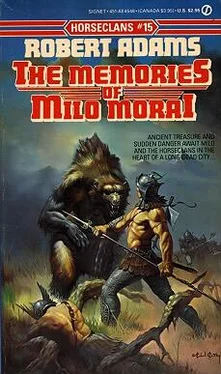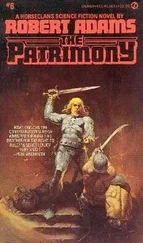While the group were lounging in the officers’ club one early evening, Milo heard a nasal, vaguely familiar voice, let his gaze rove around the room and spotted a pasty, vaguely familiar, face of a captain who was both talking and assiduously gnawing on his nails. After a moment of thought, he placed the voice and the face and hung the proper name upon them. Without another word to his companions, he stood up, pulled his Ike jacket down and straight, then paced deliberately across the shiny floor.
He came to a halt directly in front of the nail-biting officer, clicked his heels together smartly and said, “Guten Abend, mein Herr Sturmbannfuhrer Jarvis. How is it that you’re still wandering around loose without a straitjacket? Remember me? I’m Milo Moray.”
The wan man became even paler, and his muddy-brown eyes widened and his jaw went slack, revealing to Milo that he looked to have not brushed his stained, crooked teeth since last they had met back at Fort Benning years before. His lips finally began to move, but no sounds came from him for a few moments.
Finally, he got wind behind his words.“ ... be impersonating an officer of the Army of the United States of America . You can’t be a real officer, simply cannot be! They promised me, swore to me, that you’d never, ever get a commission.”
“So,” growled Milo, “it was you, eh? You were the one who kept getting my promotion requests blocked.”
“Of course I did, Moray, I had to ... I just had to, and you know why, too. I thought it all out after you had had me reprimanded and demoted. I realized that I had been right about you from the start.”
The two officers at an adjoining table, to whom Jarvis had been talking, were clearly puzzled, so Milo stated, “Gentlemen, this man was a major in 1942—CID, I think—I was a Regular, first sergeant of a basic-training company. He waltzed in, found out that I speak a number of languages, and proceeded to accuse me of being some kind of Nazi spy or plant. He caused me a good deal of trouble, but I was proved innocent of his groundless charges and returned to duty; he was brought up on charges, and had it not been for the war and some well-placed friends he had, he would probably have been cashiered, let go for the good of the service. As it was, he was, as he just said, reprimanded and demoted to first lieutenant. This is the first time I’ve laid eyes on the lunatic since then.”
Turning back to Jarvis, he said, “Well, you tin-pot Torquemada, so you still think I’m a Nazi, eh?”
“Oh, no, Moray, not anymore, not for years now, not since I thought it all out. I know you for what you really are, now, you see. That was why I exacted certain promises from certain friends in high places, you see. I don’t know . ., I still don’t know just what you are. But I do know you’re not one of us, that you’re not a human being. That’s why I knew that I had to do all that I could to deny you power, deny you control over real people, human people, for as long as I could. I did it for humanity, to protect us all from you.”
Jarvis turned to the two other officers, tense, intent. “You see, Moray . . . this thing that calls itself Moray . . . it’s not really a man at all. It’s nonhuman. I know. I sensed it years ago, but now I know, / know. Now he ... it will probably kill me because I know, but when I die, you must know that it will be for you, for you and all the rest of real humanity. Can’t you see? Can’t any of you see? He’s inhuman . . . no, unhuman. I’ve seen him in my dreams—and just ask anybody who knows me, sooner or later my dreams all come true—I’ve seen him walking around in a world where almost all the real human beings are lying dead all around him. All of humanity lying cold and dead, with animals eating their bodies, and him, it, this thing that calls itself Moray, still alive. I’ve seen it all. I’ve seen it. You’ve got to see it! Can’t you see it, really?”
Milo admired the restraint and fast thinking of the older of the two officers. “Possibly, Captain Jarvis, if Bill and I were able to talk to this officer, and, uh, examine him outside, in a less noisy place for a while . . . ?” Arising, he said, “Major, would you please walk outside with us briefly?”
In the foyer, the lieutenant colonel sighed and shook his head sadly. “Poor Jarvis—he’s never been strung together very tightly, not as long as he’s been here, at any rate, and I would venture a layman’s opinion that he finally went over the edge this evening. You probably triggered it, Major Moray, but don’t feel too bad about it. As I say, it has clearly been coming for a long time.”
Milo nodded. “I was told by a psychiatrist who had interviewed Jarvis that the man was, even back in ’42, a mental basket case. But I can’t say that I’m sorry about bringing on his dissolution, this way. You both heard him say that he had twisted tails to keep me from being commissioned.”
“And you believe his babble, major?” asked the younger officer.
“I do, captain, simply because someone or something kept me a sergeant for most of the war, kept getting commission request after commission request bounced back marked ‘disapproved.’ The only thing that ever got me commissioned, finally, was combat attrition, and that, well after D-Day. And if those commission requests had not been disapproved, there is a chance that the best friend I ever had would still be alive today. So, no, I’m not in the least sorry if it was my presence, my words, that drove that bastard in there over the edge.
“But what do we do now, colonel?”
The older officer frowned. “Let me make a couple of calls, eh?”
When the captain at last ushered Jarvis out into the foyer, it was emptied of all its usual personnel and any members other than the two captains, the colonel and Milo. Milo’s wrists were secured with handcuffs and a brace of hard-eyed military policemen flanked him.
“What . . . ?“ began Jarvis.
“There is some reason to suspect that you may be right about this officer, Captain Jarvis,” said the colonel, “I want to take him over and let Major Tatian look him over. Maybe he can tell us whether or not he’s human. If a surgeon can’t, who can, say I. You’ll come with us, of course—since you rode the hunt for so long, I feel you should be there when the fox is driven to ground. Let’s go.”
At the post dispensary, the tired duty officer wasted no time and took no chances. Before Jarvis had stepped more than a few feet beyond the doorsill, there was a big, beefy medical corpsman on either side of him, gently but very firmly gripping his skinny arms with hands the size of hams.
But it did not prove to be that easy, after all. When the third corpsman, smiling and speaking soothing words, began to unbutton Jarvis’ uniform blouse and he saw a fourth approaching with a straitjacket, the slight man shrieked and began to resist with an unsuspected strength, flinging the big, strong men about the room like so many rag dolls. It devolved into a brief battle-royal, finally requiring the full efforts of five corpsmen, the surgeon and the two military policemen to immobilize the raving officer long enough to get the straitjacket on his arms and body and some thick webbing straps buckled around his ankles and legs.
After the patient had been borne off and strapped to a bed, someone at last thought to unlock Milo *s hand-cuffs. As he rubbed his wrists, Milo thought that the surgeon had come out of the fracas with the least amount of damage—he would have a hellacious black eye, but that was mild when compared to the injuries of his staff members and the two MPs, most of whom looked as if they had been knocked down and run over by a herd of maddened, stampeding horses.
“God be thanked that I thought to trick him into coming over here,” said the colonel with fervor. “Can you imagine what kind of shitstorm a donnybrook like that would’ve whistled up if it had happened in the O-Club? Thank you, Major Moray. You’re one of General Barstow’s staff, aren’t you?”
Читать дальше












